Becoming a Better Writer in 30 Days or Less
Update Bonus: 21 Shocking Writing Prompts to start writing your next book or short story optimized Quick Pinterest Pin at the bottom of the Page.
6+ Easy Practical Steps to Becoming a Better Writer in 30 Days or Less
Follow these strategies below and you will most assuredly be a better writer than when you started.
Whether you want to become a technical writer, a ghostwriter, a TV writer, a travel writer, or just learn how to write your essays better, these tips should prove helpful.
Becoming a better writer isn’t difficult, but it absolutely takes a solid discipline.
As with most things the more hardcore you go with these strategies, the more you’ll get out of it.
6+ Easy Practical Steps to Becoming a Better Writer in 30 Days or Less:
- Start a Blog
- Read about writing every day
- Write every day
- Research Storytelling
- Read about different types of writing
- Read, read, read
- Be a Critical Consumer
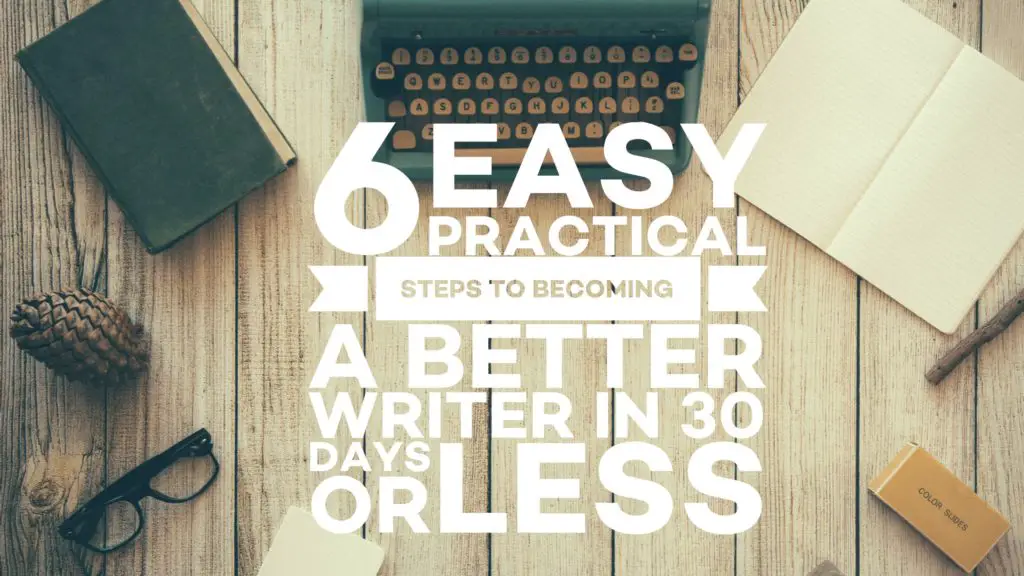
1. Become a better writer by starting a blog
If you start a blog you are more likely to start writing than if you don’t.
There are plenty of good sites to start blogging today for free, wordpress.org being one of them and they allow you to use free plugins as well compared to wordpress.com.
Disclaimer: You can always start a “free” blog, but the terms of use for free sites is that they can shut it down for any reason (at ANY TIME). So it’s possible to randomly lose all your hard work on a free blog. Be careful.
So just a fair warning, you can use free blogging, but I haven’t had much success with it personally. I started many free blogs and none of them stuck. This is the only one I’ve paid for and I’m glad I did. And it is the only one that I continue working with.
If you want to start a legitimate blog or if you think you might try to monetize it one day you are eventually going to need a hosting site.
I personally use Bluehost. They made getting my blog started EXTREMELY easy and their ‘one-click’ WordPress.org setup was ridiculously smooth.
Bluehost is one of the top web hosting companies in 2020. You can start your own blog with them for as low as $3.95 a month (on the page you’ll see that they say it is normally $7.99, but I’ve never seen them try to get anyone to start for that.) The $3.95 sale price only comes with their 36-month plan. I use them and that’s what I did and I’m happy about it. ( I did the 36-month plan and so far we are still happy with it 🙂 )
Sign up them and you can also get your domain free if you purchase a 12 month or longer hosting plan (that’s worth $15). As I said, we did the 36-month plan because it was the best deal but you can choose any plan. If you’re not planning on monetizing your blog it might be a good idea to start with a free blog.
I can tell you from personal experience that a free blog won’t motivate you to write as much as paying for a blog, but it’s up to you to decide what works best for your unique situation. If you really love blogging you never know when you might decide to monetize and at that moment you’ll be happy you decided to host with Bluehost and owning your domain.
Having your own site looks more professional to affiliate programs and readers. You will be able to have a better following, no one can shut you down for no reason (like on a free blog) and at any moment you will be able to monetize through ads and affiliate programs.
Some of my blogging mentors had their blogs going for years before they decided to monetize. You just never know.
At the same time, you can always start a free blog to test things out and buy a domain name and hosting later, but there is no guarantee the price will still be as good and no guarantee that the domain name you love will still be available.
Do what’s best for you and your specific situation 🙂
For me personally, I started with Bluehost and WordPress.org right from the start because I enjoy work from home and being my own boss. As far as online jobs and work, blogging is one way to pay yourself and work when you want.
If you want to reasons why it’s a good idea to start a blog, you can check out this post here: Why Start a Blog
If you are interested in more details on how to make a great blog from scratch you can see this post: How to Become a Blogger in 2019
2. Read about writing every day
Good writers all have certain traits in common. One of them is that they read A LOT.
Most of them read every day. Now I won’t say that I’m a good writer that’s up to others to decide, but I do read mostly every day.
You might be thinking “but you probably grew up reading as a kid and loved it.” Not true! I personally couldn’t stand reading and writing growing up. Hated reading with a passion actually.
It actually wasn’t until I got into college that I really started to read and then probably a couple of years into it that I started to enjoy it.
So you don’t have to be some kind of savant to get started in writing. You just have to have drive and discipline.
But this type of reading isn’t just reading at first. It is specifically looking to read about writing (I know, it sounds boring and it can be tedious but the foundational knowledge will help in the long run). During your becoming a better writer in just 30 days, you will want to be keen to read and learn about writing, especially if you want to do writing online or freelance writing.
Try to read things that help you get to where you want to go. If you want to become a blogger read about blogging tips and tricks. < (I googled it for you)
If you want to become a ghostwriter, read about how to become a ghostwriter. (Pssst! What’s a ghostwriter? A ghostwriter is a writer that gets paid to write something for someone but doesn’t own the project. For example, a person could hire you to write a novel for them, but they get to publish it as the author. They paid for it and own all the rights to it and you are just the ghostwriter.)
It’s just one way to get paid to write.
If you want to be a technical writer, read about the best practices of technical writers. As long as you are willing to read the right things you can learn to write anything 🙂 there really is nothing holding you back.
Look up blogs, articles, look at the library for books on writing. Depending on what type of writing you want to pursue will be very important to the writing that you read about.
As you get a good idea of a foundation for the type of writing you want to do, you can start to branch out studying other types of writing. You will see how understanding the why’s and what’s and styles behind them all can help you in your pursuit of becoming a better writer.
Look on Amazon for great reads on writing. I personally recommend these ones for when you need to think outside the traditional box or when you get bored of reading about writing:
The View From the Cheap Seats by Neil Gaiman
Talk Like TED: The 9 Public-Speaking Secrets of the World’s Top Minds
These are non-traditional and will help open up your mind to more strategic possibilities for the potential of writing. Full disclosure: I didn’t read any of these yet. I took Neil Gaiman’s Masterclass, which was amazing and I highly recommend it.
In fact, I recommend Masterclass to anyone who loves learning and thinks it’s neat to learn from celebrities (such as Dan Brown, James Patterson, Samuel Jackson, Christina Agulera, and many more.
@ $15 a month, it is extremely worth it. I’ve been using it for a year and learn so much from professionals that I never would have. And the lessons always feel personal. Sometimes the teachers who are celebs even write back to your comments. Can you imagine Samuel L. Jackson responding to your comment?) about their crafts.
On Writing was recommended to me 2nd hand by a writing mentor of mine. He said that it was good if you need to get outside the traditional learning about writing books and it was interesting if you’re a fan of Stephen King novels too.
I love TED talks, I watch some when I can, so when I saw this book about public speaking from TED talks I knew it would be a winner with powerful knowledge.
If you’re wondering why I would suggest a public speaking book for learning how to be a better writer, it is simple.
When writing has been your profession for years you learn what crafts complement great writing. For instance, IF you want to be a great writer, your secret weapon is research. If you aren’t a personal professional researcher, it will be nigh impossible for you to become a great writer. Public Speaking skills go beyond just speaking and writing.
Those skills bleed into SO many professional avenues that it will not only make you a better writer. It’ll make you a better person in almost everything you do (unless you live in a hole and never interact with other humans in any way, shape, or form.)
Click to Tweet
Read some of the reviews on each one to see if they look like something you would enjoy. (And DON’T just read the 5-star reviews, read the bad reviews too. I almost always read the bad reviews, most of the time, I read the 1-star reviews first. This actually saves me time when shopping for a new product, especially tech products.)
Want to get paid to write? Check out Writing Paychecks
- There is a simple method over 30,000 people use to get paid for freelance writing online.
- Opportunities can get started in just minutes a day, all from your home couch.
- It’s easy to get started! No previous experience or degree required to start.
- Exclusive job listings for writers, updated daily.
Check out Writing Paychecks to see if you can start getting paid to write today.

3. Write Every Day
Now this one is the kicker. If you do nothing else from this post, do this one thing and you’ll surely become a better writer. Write every day.
Now you can:
Write at a certain time every day
Or
Write a certain amount of words every day
Or
Write a certain amount of time every day
You can mix and match these however suits you best. You try them all out and see if one is easier and sticks better for you.
Me personally, I like writing a certain amount of time and writing at a certain time of the day. This keeps me going and I don’t feel bad if I don’t come up with a certain amount of words.
I tried writing a certain amount of words every day and I couldn’t keep up with it and instead of doing it I’d skip it because I knew it would take “too long.”
You see, you are more likely to develop a habit if you start small and take smaller bites that you can handle.
If you already write every day that’s great and you can choose to write more.
If you don’t write then start small.
Start with 1-10 minutes a day. If you find that easy, do more. If you find that hard, write less. At first, start with what seems easy to you and build on that.
The last thing you want to do is start with a habit that’s too hard to do every day. If you bite off too much you might not swallow it. If you find yourself dreading it, that’s a bad sign. If you find that you easily go a week without doing it, that’s a sign you tried to do more than you should start with.
If you want to do a certain amount of words every day I recommend starting with 100 a day. If that’s easy write more. If that’s too hard write less.
I tried 500 words a day and I couldn’t keep up with it. It just became tedious and therefore unenjoyable. I’m a professional writer, so that’s why I recommend starting with less. I mostly work in email writing, so if I’m on a job I might write more or less on those days, but if I’m not writing for a client, 500 just didn’t seem appetizing.
Blogging has definitely changed that for me, that’s why I recommend Starting a Blog.
I now try to write a certain amount of time every day and usually I find that if I get started, I end up writing longer than the first little amount that I force myself to do anyway. Thus, this strategy works very well for me. I’d start with the easy goal of 1 minute. 60 seconds, if you can’t do something for 60 seconds a day, maybe you don’t really want to do it at all.
You can also benefit from writing at a certain time every day. You will know what time works best for you.
It could be first thing in the morning. Some people find that this is their most creative and profitable time.
Me personally, I don’t do so well in the morning, I prefer to write at other times. Afternoon and evening, not late evening though. If I feel my eyes start to droop, I just know that I’m not gonna get much coherent information on the page. (It can be comical though. I’ll go back and read what I was writing the night before and it can be some of the worst writing! I’ll save myself time and energy if I just get some sleep or caffeine instead of trying to push through.)
You might like to write during your lunch at work, or first thing when you get home after eating something.
It’s always a good time to be able to put something on T.V. and write while relaxing.
So you can take time and figure out when is best for you to write.
If you write even just 10 minutes a day for 30 days you will be a better writer at the end of that short 30 days, and you might find that you have developed a habit you look forward to and fully enjoy 🙂 I know I do.
Update: Since Blogging and traveling more while blogging I find that a certain amount of time a day and a certain time of the day becomes tedious and makes blogging less enjoyable for me personally. Again this may work for you, so don’t hesitate to experiment.
Now, I enjoy writing at some point during the day. I find that it doesn’t have to be strict or a certain number of anything. I sit down to write and I find that I can easily be there for hours or an interruption might come up like a family member or friend wanting to hang and I am able to get up and go without any sort of remorse. I find this to be key to my success as a writer and blogger.
4. Research Storytelling
Storytelling will benefit you no matter what writing niche you go into, except maybe academic writing. Even then I’m sure it could be a little useful.
If you look around, you’ll start to see how stories are everywhere and people love stories. We eat them up. We can’t get enough of stories.
Stories are in the movies. Stories are on the news. On blogs, web pages, profiles, social media, history, we find stories fascinating and that is why they work so well and why we should find ways to incorporate the skill of storytelling into our writing, no matter what niche we are in.
Let me give you an example:
I once knew a guy.
He had a problem.
He was about 30 years old living in America, but he didn’t know how to read or write…
Did you notice something there?
I introduced a character and a problem he had, did you notice how you instantly went into “consuming story mode.” Did all your attention get drawn into the short story that started?
If not, that’s okay. It wasn’t super dynamic, but if you did, take time to think about why that happened. Stories are a powerful tool you need to add to your writing arsenal. Study stories and storytelling to engage your audience and grab their attention when you choose.
Stories are great at helping illustrate a point. Great as an ice breaker and a great way to regain your audience’s attention if you think you are losing them.
And stories work across all mediums. Art, writing, presentation, public speaking, with a group of friends or colleagues. Storytelling is a life skill that anyone would benefit from developing, but especially writers.
Want to get paid to write? Check out Writing Paychecks
- There is a simple method over 30,000 people use to get paid for freelance writing online.
- Opportunities can get started in just minutes a day, all from your home couch.
- It’s easy to get started! No previous experience or degree required to start.
- Exclusive job listings for writers, updated daily.
Check out Writing Paychecks to see if you can start getting paid to write today.




5. Read about different types of writing
After you get a good handle for your specific niche of writing, you will really benefit from studying other styles of writing and using different tips and tricks to make your style even better by borrowing from the other types.
Different Types of Writing include but not limited to:
- Copywriting
- Fiction
- Non-fiction
- Blogging
- Email Writing (cold emails, drip campaigns)
- Article Writing
- Academic Writing
- Web Page Writing (About us, Home pages, etc)
- Mailers
- Landing Pages
- Branding
- Sales Pages
- Video Scripts
- Sales Funnels
There are probably more. And there used to be a time not long ago where most of these genres didn’t have precedence, but these days knowing how to do any one of these well can mean good freelancing money for you or better your own business. Either way $$$.
And don’t get me wrong, writing isn’t all about money, but it sure is nice to get paid to do something you enjoy doing either way.
Even looking at this list might help you think more about what you want to do or discover for yourself. You may have not been aware that some of these opportunities existed before now, but now you know and can do something about it.
6. Read, Read, Read
It should make sense at this point. One easy way to get better at writing every day is to read every day.
And don’t just read things about writing.
Read blogs, read history, read academic writing, read fiction and non-fiction.
Having a wide array of reading will make you well rounded and increase your understanding and vocabulary.
Writing a lot is necessary but if you don’t expose yourself to all sorts of different voices and writing styles you might find that you don’t have much to write about.
I recommend have light reading along with tough to read stuff simultaneously.
By having light reading you’ll be able to enjoy reading and move along. But having tough to read material will stretch your will power and ability as a reader and writer.
Exposing yourself to writing that is better than your own will help you improve. You will also more readily observe bad writing and notice when you yourself are writing poorly.
Humans have been writing for some time now and many tricks of the trade are out there for you to see, experience, enjoy, and make a part of your own writing repertoire. So don’t skip the reading.
Bonus: Be a Critical Consumer
Being a critical consumer doesn’t mean you make a bunch of critical comments on the stuff you read and watch like your the next reality TV show judge.
Being a critical consumer is the opposite of being a mindless consumer.
We all watch and read a lot of entertainment.
When you are reading or watching your favorite stories or documentaries take mental notes.
Think about how they use dialogue. What is the main theme of the story?
How did they seamlessly carry you through each step of the story while you consumed it?
Did something not sit right with you about the character development?
Were all the important plot questions answered satisfactorily?
Think critically while you enjoy your content.
Want to get paid to write? Check out Writing Paychecks
- There is a simple method over 30,000 people use to get paid for freelance writing online.
- Opportunities can get started in just minutes a day, all from your home couch.
- It’s easy to get started! No previous experience or degree required to start.
- Exclusive job listings for writers, updated daily.
Check out Writing Paychecks to see if you can start getting paid to write today.




Interested in starting a blog of your own? Check out Bluehost.
I hope this helps! Now go write something!
What do you do to get better at writing?
What did I not mention here?
Do you have a favorite book or reading you recommend to help others improve their skills?
How are you becoming a better writer?
Another Post you Might like:
Mythical Creatures | 7 Tips on How to Write Mythical Creatures
Other Popular Posts you might enjoy:
5 Tricks How to Hide Your Villain Right Before Their Eyes
10 Tips How to Write Villains that Play Mind Games with Their Victims
4 Tips How to Write your Character Hitting Rock Bottom
10 Toxic Bad Habits That’ll Crush Your Fictional Character’s Relationships
Updated Bonus: 21 Shocking Writing Prompts to get you started writing your next book or short story.
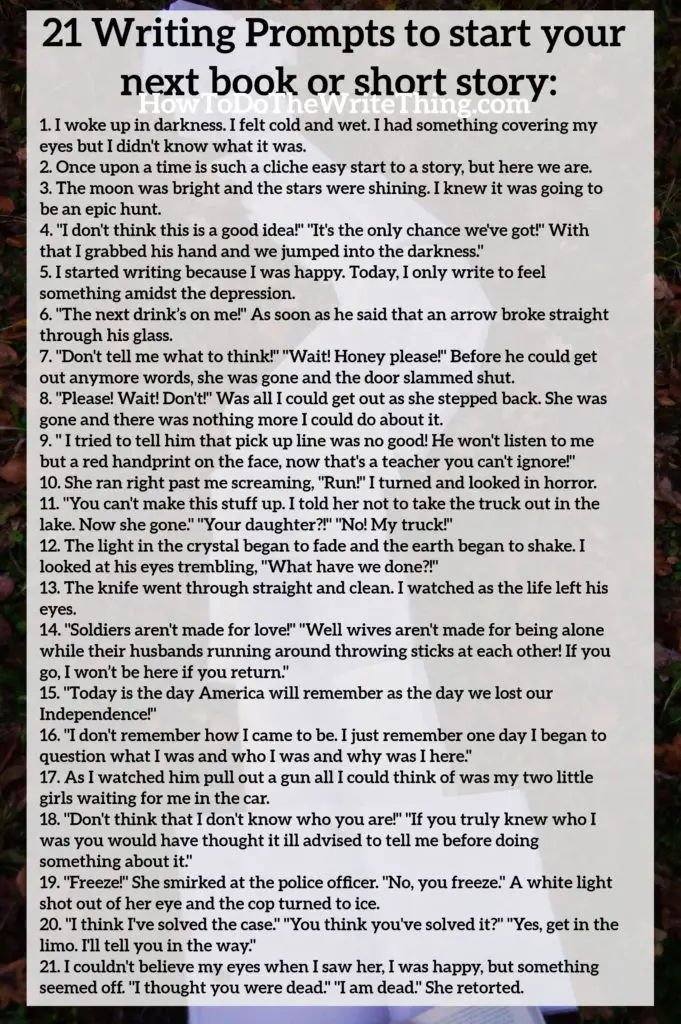

Check out these FREE trial resources from Amazon for when you work from home (or are stuck at home 🙂 ) As an Amazon associate, if you do sign up or buy anything using Amazon links from our site we make a commission at no extra cost to you.
Free Prime Membership Trial:
Try Amazon Prime 30-Day Free Trial
Try Prime Discounted (Free Trial)
Get Unlimited Music for Free (30-day free trial):
Free Baby Registry:
Shop Amazon – Create an Amazon Baby Registry
Make your Free Amazon Wedding Registry:
Create an Amazon Wedding Registry
Make sure your posts are readable. Use this readability score check
We hope you enjoyed: 6+ Easy Practical Steps to Becoming a Better Writer in 30 Days or Less!
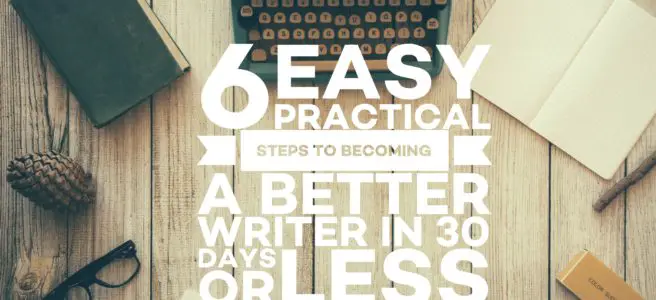
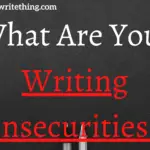
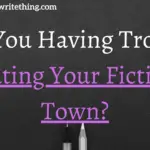
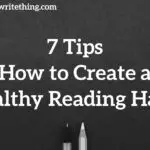
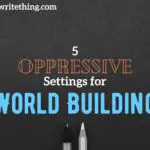
I’d love to learn from Masterclass someday. By the way, thanks for the tips!
I have been using Masterclass for almost 2 years and I really enjoy it. I highly recommend it when you get a chance. It is really fun especially if you have several passions and enjoy learning for fun. No problem and Thank you! 🙂